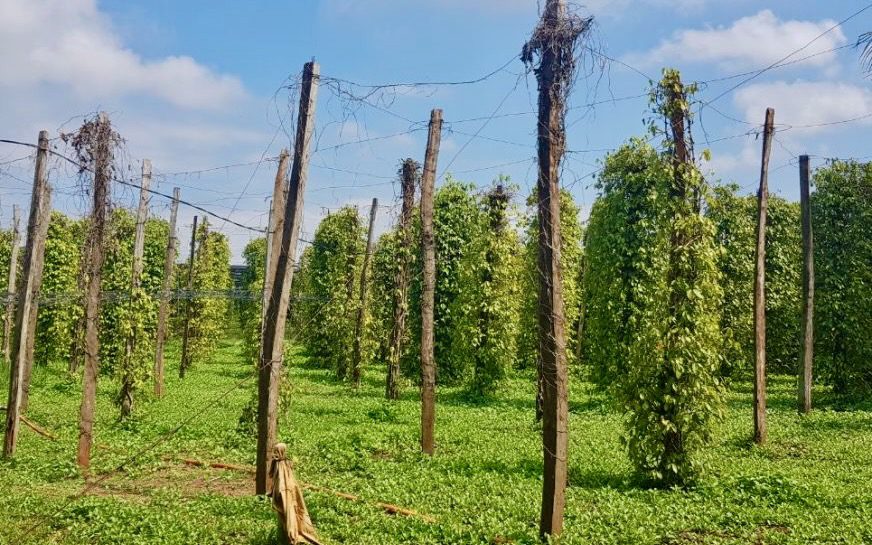Tbong Khmum pepper farmers say they’re abandoning their fields as the crop’s appeal has withered under poor prices and bad harvests, with one agriculture official blaming bad farming habits on the decline.
A 62-year-old farmer in Memot district’s Da commune, E Channy, said he grows pepper on two different farms, but has completely abandoned one, because pepper vines growing on 4,000 of the 5,000 poles he placed in the farm had died.
In the more than 15 years he spent farming the spice, he’s seen prices fall from $10 per kilogram to $3 per kilogram this year. Channy said he was now looking at other crops, like durian, pineapple or oranges.
“I don’t want to take care [of the fields]. It’s the end,” he said. “I don’t have the money to continue. I took out the poles. Why should I grow more? The land wasn’t good to grow.”
According Heng Piseth, director of the Tbong Khmum provincial agriculture department, the province used to have around 2,000 hectares of pepper plantations, but it has declined by about 40% and is now closer to 1,000 hectares of vines as of this year. Some farmers were switching to a new crop, but he encouraged farmers to persist with the spice, adding that the province had helped farmers in distress in 2019.
Memot’s Da commune has the highest concentration of pepper plantations in the province, and other farmers said they were thinking about giving up on pepper because of falling prices.
Earch Nang, a 52-year-old pepper farmer in the commune, lost around 1,000 poles this year because the pepper plants stopped growing.
Nang said he wanted to continue growing the plant, but the thought of planting a different crop had crossed his mind.
“At first I planned to change the crops, but I don’t want to grow [new plants], just continue with the pepper crops,” he said. “If it doesn’t work, I will reconsider.”
He was also bothered by the low market price. He can currently sell pepper on the market for around $3 per kilogram, but he would need to sell it for at least 25,000 riel, or about $6.25, to cover his expenses, he said. The farmer said he already sold off about 1 hectare of land to pay off his debt.
“We pay for everything: compost, fertilizer, and watering in the dry season. And during harvest season, we need to rent workers, but in total the price isn’t enough” to cover expenses, he said.
A third farmer, Nhaem Makara, said that she wasn’t losing as many plants on poles to give up completely on the crop. But the market price was frustrating her.
When asked why some farmers’ crops were wilting, Piseth, the agriculture official, blamed the farmers, saying they weren’t doing a good job.
“Because they didn’t take care of their crops,” he said. “Other farmers can grow [it]. Because you asked only the people who have a problem, who don’t care for their pepper. If you ask the farmer who takes care, they can sell every season.”
Piseth encouraged farmers to continue selling the crop in order to supply the international market. According to an Agriculture Ministry report, the country exported 3,843 tons of pepper in the first four months of the year, with more than 90 percent going to Vietnam.
However, Theng Savoeun, head of the Coalition of Cambodian Farmer Community, disputed the official’s claim, saying that agricultural departments should investigate why plantations were failing and try to offer additional training or support to address these problems.
He also felt it was okay for some farmers to transition away from the crop, which may reduce issues like oversupply.
“What we want is for the agriculture department to provide the training to take care of the crop,” he said. “If the crops die or don’t grow, [they should wonder] what is a possibility for them to try to solve this problem.”













